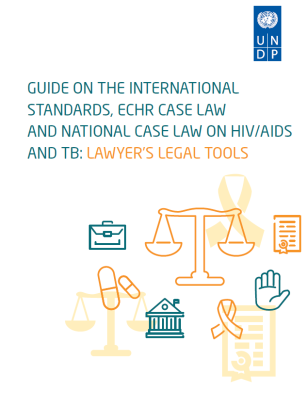Guide on the international standards, ECHR case law and national case law on HIV/AIDS and TB: Lawyer’s legal tools
Guide on the international standards, ECHR case law and national case law on HIV/AIDS and TB: Lawyer’s legal tools
July 18, 2022
This Manual includes the following topics:
• analysis of international standards for the protection of the rights of people living with HIV and TB;
• cases from the National Case Law and the ECHR;
• informational resources and legal tools that would be useful to a lawyer to ensure the implementation of patients' rights to access to treatment during the war, both on the territory of Ukraine and abroad;
• how to get access to HIV and TB treatment in Ukraine and abroad;
• procedure for accessing the patient's medical record to restore information about the HIV or TB treatment regimen in conditions of impossibility of contact with the attending physician and conditions of the patient's remaining abroad;
• possibilities of reducing the risks of HIV and TB infection in wartime conditions;
• the algorithm of actions regarding the request for medical assistance, not only to collect evidence to defend victim’s rights, but also to apply timely post-exposure prophylaxis of HIV and other infectious diseases, in the case when the client is a person who has experienced sexual violence;
• the international standards, the soft-law and hard-law legal framework to enable the lawyer to shape the strategy for defending the rights of the person living with HIV or TV, to prevent stigmatization of the person and diseases themselves, and to provide the lawyers with the ready-to-use legal tools of prevention of such types of violation of human rights.
This Manual has been developed before the full-fledged war. Current developments in Ukraine require human rights defenders to be equipped with the tools that go beyond legal issues. Given the complex conditions in which advocacy is carried out today, this Manual gives law practitioners ready-made action algorithms, instructions, and road maps to protect the affected persons.

 Locations
Locations




